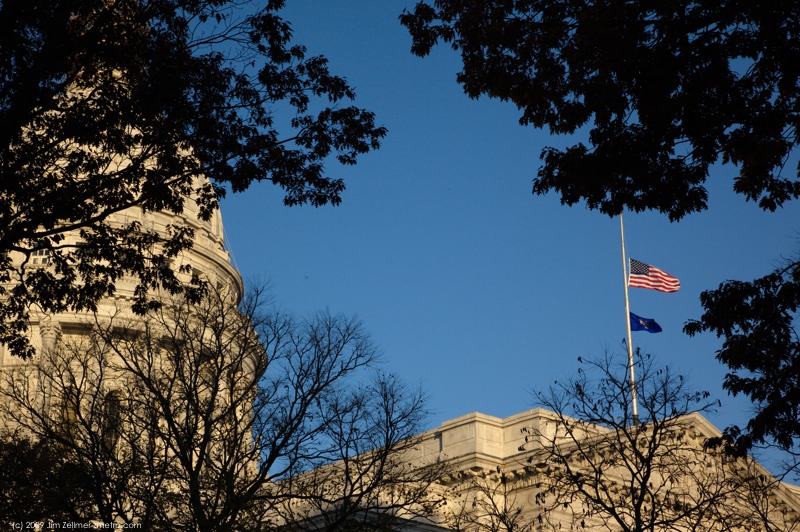As US President Barack Obama glided through China, a chorus erupted in New York and Washington: the problem with the global economy is China’s exchange-rate policy, and Obama’s No 1 job is to slay it. It’s sad that these people actually believe what they are saying: the same “logic” got the world into the current mess. In the feverish hallucination of salvation, they think that moving China’s currency policy would right all wrongs.
The US Federal Reserve is the biggest currency manipulator in the world. Not only does it keep the short-term interest rate at zero through its vast purchase programme for mortgage-backed securities, it also keeps credit spreads and bond yields artificially low. Its manipulation stops money, bond and credit markets from pricing either the Fed’s policy or the US economic plight. All the firepower is packed into the currency market, giving speculators a sure bet on a weaker dollar and everything else rising. Here comes the biggest carry trade ever: the Fed is promising no downside for shorting the dollar.
The US Treasury writes an annual report, judging if other countries are manipulating their exchange rates. It should look in the mirror. Even though the Fed is not directly intervening in the currency market per se, its manipulation is equivalent to pushing down the dollar by non-market means.
Monthly Archives: November 2009
Playing with fireForget China, the US Federal Reserve is the world’s biggest currency manipulator
As US President Barack Obama glided through China, a chorus erupted in New York and Washington: the problem with the global economy is China’s exchange-rate policy, and Obama’s No 1 job is to slay it. It’s sad that these people actually believe what they are saying: the same “logic” got the world into the current mess. In the feverish hallucination of salvation, they think that moving China’s currency policy would right all wrongs.
The US Federal Reserve is the biggest currency manipulator in the world. Not only does it keep the short-term interest rate at zero through its vast purchase programme for mortgage-backed securities, it also keeps credit spreads and bond yields artificially low. Its manipulation stops money, bond and credit markets from pricing either the Fed’s policy or the US economic plight. All the firepower is packed into the currency market, giving speculators a sure bet on a weaker dollar and everything else rising. Here comes the biggest carry trade ever: the Fed is promising no downside for shorting the dollar.
The US Treasury writes an annual report, judging if other countries are manipulating their exchange rates. It should look in the mirror. Even though the Fed is not directly intervening in the currency market per se, its manipulation is equivalent to pushing down the dollar by non-market means.
Goldman apologises for role in crisis
Francesco Guerrera, Justin Baer and Tom Braithwaite :
Goldman Sachs apologised for its role in the financial crisis on Tuesday and pledged $500m over five years – or about 2.3 per cent of its estimated bonus and salary pool for 2009 – to help 10,000 US small businesses recover from the recession.
The moves come as the bank tries to defuse a political and public backlash over its plans to share billions of dollars among top dealmakers after rebounding sharply from the turmoil and earning record profits in the first nine months of the year.
Lloyd Blankfein, Goldman’s chief executive, told a corporate conference in New York that the bank regretted taking part in the cheap credit boom that had fuelled the pre-crisis bubble. “We participated in things that were clearly wrong and have reason to regret,” said Mr Blankfein. “We apologise.”
Mr Blankfein also told the conference he wished he had not told the UK’s Sunday Times newspaper that Goldman did “God’s work” – a remark that was seized upon by the bank’s critics – and said it had been meant as a joke.
Mr Blankfein spoke hours before Goldman revealed plans to invest $500m over five years in business education, technical assistance and venture capital to help 10,000 small businesses across the US. The yearly amount of about $100m to be spent on the initiative – which will be overseen by a panel co-chaired by Warren Buffett, a Goldman investor – is equivalent to a good trading day at Goldman. In the third quarter, the bank had 36 days in which traders made more than $100m.
Mr Buffett told the Financial Times that the small business programme was not a response by the bank to recent criticism. “This is a big initiative,” he said. “This is not a one-day or one-year wonder. It’s a continuous programme.”
GE Pursues “Stimulus Pot of Gold”
Elizabeth Williamson & Paul Glader:
The financial crisis hasn’t been kind to General Electric Co. Its stock has lost almost half its value, the government has stepped in to prop up its enormous financial arm, and sales have slumped in core industrial businesses.
But Chief Executive Jeffrey Immelt now has his eye on a huge new pool of potential revenue: Uncle Sam’s stimulus dollars. Mr. Immelt, a registered Republican, quips about the shift in thinking in the nation’s corner offices: “We’re all Democrats now.”
GE has high hopes for the strategy. It says that over the next three years or so it could bring in as much as $192 billion from projects funded by governments around the globe, such as electric-grid modernization, renewable-energy generation and health-care technology upgrades.
The company is just starting to see a payoff. Last month, for example, President Barack Obama announced $3.4 billion in government-stimulus grants for power-grid projects. About one-third of the recipients are GE customers. GE expects them to use a good chunk of that money to buy its equipment.
The government has taken on a giant role in the U.S. economy over the past year, penetrating further into the private sector than anytime since the 1930s. Some companies are treating the government’s growing reach — and ample purse — as a giant opportunity, and are tailoring their strategies accordingly. For GE, once a symbol of boom-time capitalism, the changed landscape has left it trawling for government dollars on four continents.
Madison’s Overture Center & MMOCA – A Panoramic View
Fond farewell to a brilliant thinker
The scene is Detroit, a training room at the headquarters of one of the three great US car companies. A group of corporate vice-presidents is attending a course being given by a distinguished management thinker.
“What you are telling us is great,” the VPs say, “but you are talking to the wrong level. You should be speaking to the next tier up.” The next week, working with more senior managers, he hears the same thing. “This is great, but you are talking to the wrong level. You should be speaking with the chief executive.”
The week after that, our thinker finally gets in to see the boss. “This is great,” the CEO says, “but you should be speaking with my subordinates – I’d need their support in order to do it.”
This is a true story, as told by Russ Ackoff, the management thinker in question, who died a few days ago, aged 90. Two key Ackoffian ideas emerge from this tale. First, do not wait for others in the business to start changing things. Go and do it yourself. But second, and more important: never forget that everyone in the business is interconnected, that they are all operating as part of a system, that tinkering with one part of the company is never really enough, and may even make things worse. You need to see the business as a whole, as a complete system, if you want to make lasting improvements to it.
China Channels Monkeybrains
Too much debt got us into this mess, and too much debt will see us out of it. Socialize the risk of a new cycle of open-throttle lending and cling to the monetary system that assures a repeat crisis. Such, approximately, is the global policy-making consensus. Central bankers and finance ministers have achieved an uncommon meeting of the minds. The cure for what ails us is the hair of the dog that bit us, they prescribe, though not in exactly those words.
It’s no small thing that China is especially enamored of the shot-and-a-beer-for-breakfast approach. Nothing about China is small or insignificant nowadays, since the Chinese economy is actually growing. It might, indeed, account for 74% of worldwide GDP growth in the three years to 2010, the International Monetary Fund estimates. Since 2005, China has generated 73% of the global growth in oil consumption and 77% of the global growth in coal consumption. By the looks of things, it accounts for a fair share of the growth in worldwide luxury-car consumption, too:
Another Glorious Saturday Photo

Buffett’s Betrayal….
When I was 14, Warren Buffett wrote me a letter.
It was a response to one I’d sent him, pitching an investment idea. For a kid interested in learning stocks, Buffett was a great role model. His investing style — diligent security analysis, finding competent management, patience — was immediately appealing.
Buffett was kind enough to respond to my letter, thanking me for it and inviting me to his company’s annual meeting. I was hooked. Today, Buffett remains famous for investing The Right Way. He even has a television cartoon in the works, which will groom the next generation of acolytes.
But it turns out much of the story is fiction. A good chunk of his fortune is dependent on taxpayer largess. Were it not for government bailouts, for which Buffett lobbied hard, many of his company’s stock holdings would have been wiped out.
Berkshire Hathaway, in which Buffett owns 27 percent, according to a recent proxy filing, has more than $26 billion invested in eight financial companies that have received bailout money. The TARP at one point had nearly $100 billion invested in these companies and, according to new data released by Thomson Reuters, FDIC backs more than $130 billion of their debt.
To put that in perspective, 75 percent of the debt these companies have issued since late November has come with a federal guarantee. (Click chart to enlarge in new window)
A Glorious November Saturday

